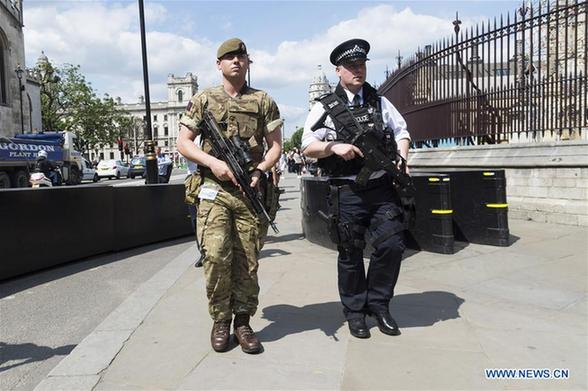Standing together against hate in Manchester
- By Heiko Khoo
 0 Comment(s)
0 Comment(s) Print
Print E-mail China.org.cn, May 25, 2017
E-mail China.org.cn, May 25, 2017
|
|
|
An armed soldier and an armed police officer patrol outside the Houses of Parliament in London, Britain, on May 24, 2017. British Prime Minister Theresa May announced Tuesday night that the country's terror threat level has been raised from "severe" to "critical", its highest level. [Photo/Xinhua] |
The suicide bomber, identified as Salman Abedi, 22, of Libyan descent born in Manchester, targeted young girls attending a pop concert by the American singer Ariana Grande, killing 22 people and injuring 59. The youngest fatality was an eight-year-old girl.
The attack occurred just outside a security-controlled area of the Manchester Arena, where the concert was held. As a result, it was almost impossible to prevent such an atrocity. Clearly, by targeting an event with such a young audience, the attacker was seeking to create maximum outrage and disgust in society.
Greater Manchester has a population of over 2.75 million. It has significant Pakistani and Bangladeshi Muslim communities but people of Arab-descent constitute a tiny minority.
As in previous terrorist attacks in Britain, the perpetrator was a local man, born and raised in this country. Some reports say he had links to criminal gangs and then "progressed" to Islamic fundamentalism. If true, this would fit the profile of many others involved in attacks across Europe in recent years.
Although the government and security services are geared up for further attacks and soldiers are now working alongside the police on the streets, this is designed more to try and reassure the public than develop a prevention strategy.
Abedi studied business and management in 2014 at Salford University in Manchester, before dropping out. Rather bizarrely, U.S. intelligence agencies released information about Abedi's identity to the press. This leak was then condemned by the British government, while police said they wanted to keep his name under wraps to investigate his connections and associations and find out if he acted alone or as part of a wider network.
At present, it is assumed the degree of sophistication required to carry out the bombing suggests participation of others and, possibly a link to international terrorist networks inspired or organized by "Islamic State." A number of suspects have been detained, including members of Abedi's family.
Islamic State weaves its ideology out of anti-imperialist rhetoric, religious fundamentalism, and a hatred of others, a narrative with a perverse appeal to a tiny and dangerous minority. It promotes an extraordinarily narrow-minded outlook focused on conspiratorial ideas, combined with blind faith and an ultra-dogmatic interpretation of Islamic thought and practice.
The people of Manchester responded to the atrocity with displays of solidarity and unity. Vigils also took place all over Britain and in a number of other countries. Communities came together to condemn this attempt to stoke up interracial and inter-religious hatred.
So, when the right-wing English Defence League attempted to stoke up conflict in Manchester, they attracted only a handful of supporters and were condemned openly by passers-by. However, isolated cases of anti-Muslim hate crime have occurred since the attack.
The bomb also interrupted Britain's general election. All parties agreed to a temporary suspension of campaigning as a sign of respect. However, everyone knows that Theresa May's Conservative Party has consistently attempted to portray Jeremy Corbyn, the leader of the opposition Labour Party, as a "terrorist sympathizer" considered "weak" on defense and security.
Nevertheless, although many on the left in Britain fear such outrages will bolster the right, it is by no means automatic that it will adversely impact Labour's electoral chances. Manchester recently elected a Labour Party member, Andy Burnham, as the city's mayor with a thumping majority of 63 percent, and the city is in a region that was the birthplace of trade unionism.
Cuts to public services have weakened the capacity of the police to deal effectively with crime. Deeper links with Muslim communities can generate more precise knowledge about potential terrorists. However, we know that various people had warned the authorities over years about Abedi's dangerous ideas, but for some reason, nobody thought it necessary to action on this information.
The fact that many of the victims were young girls evokes soul-searching questions about the future of society. The heroism of public servants working for the police and the fire brigade, and the dedication and self-sacrifice of National Health Service staff, has been universally praised.
And many spontaneous acts of kindness and bravery by strangers seeking to help moved the nation. This public spirit is part of the British cultural heritage, which finds expression in the idea of "standing together against hatred."
Heiko Khoo is a columnist with China.org.cn. For more information please visit: http://www.china.org.cn/opinion/heikokhoo.htm
Opinion articles reflect the views of their authors, not necessarily those of China.org.cn







Go to Forum >>0 Comment(s)